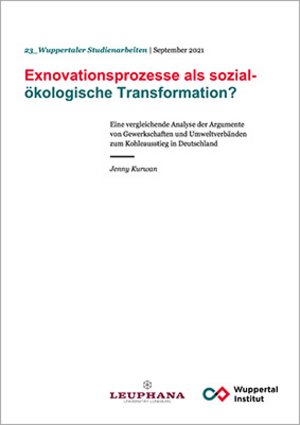Exnovationsprozesse als sozial-ökologische Transformation?
Eine vergleichende Analyse der Argumente von Gewerkschaften und Umweltverbänden zum Kohleausstieg in Deutschland

This master's thesis investigates the challenges and starting points for a common understanding between trade unions and environmental associations as central civil society actors in the debate on the future of coal. There are two guiding questions. The first question is empirical: What are the arguments of environmental associations and trade unions regarding a coal phase-out? The second one is linked to the chosen theoretical perspective of social ecology: What relationships and divisions between the understandings of nature, society and economy become visible in the actors’ arguments?
In the theoretical part of the paper, a social-ecological perspective on the use of coal in the energy sector and the so-called jobs versus environment dilemma was developed. In the empirical part, a qualitative text analysis is conducted on more than 100 public documents of different German trade unions and environmental associations. The period under investigation stretches from the end of 2014 (first government proposal to reduce coal-fired power generation) to the beginning of 2019 (end of the "Commission on Growth, Structural Change and Employment").
In the results, the arguments of the actors, as well as their changes in the period under investigation, are presented comparatively. Similarities and differences, rapprochements and distances between the individual actors and groups of actors are shown. From a social-ecological perspective, it is discussed and compared how the actors handle the jobs versus environment dilemma.
The findings suggest that the trade union approach to a just transition must be linked to climate and environmental justice concepts in order to achieve comprehensive inter- and intragenerational justice. Shaping a coal phase-out, as well as other exnovation processes, as a social-ecological transformation requires the integration of two viewpoints: Stakeholders need to both understand the current economic dependence of workers in the affected industries and recognise climate change as not just an ecological issue, but also a social and economic one.
Jenny Kurwan:
Exnovationsprozesse als sozial-ökologische Transformation?
Eine vergleichende Analyse der Argumente von Gewerkschaften und Umweltverbänden zum Kohleausstieg in Deutschland
Wuppertal 2021, ISBN 978-3-946356-25-7
(Wuppertaler Studienarbeiten zur nachhaltigen Entwicklung no. 23)
